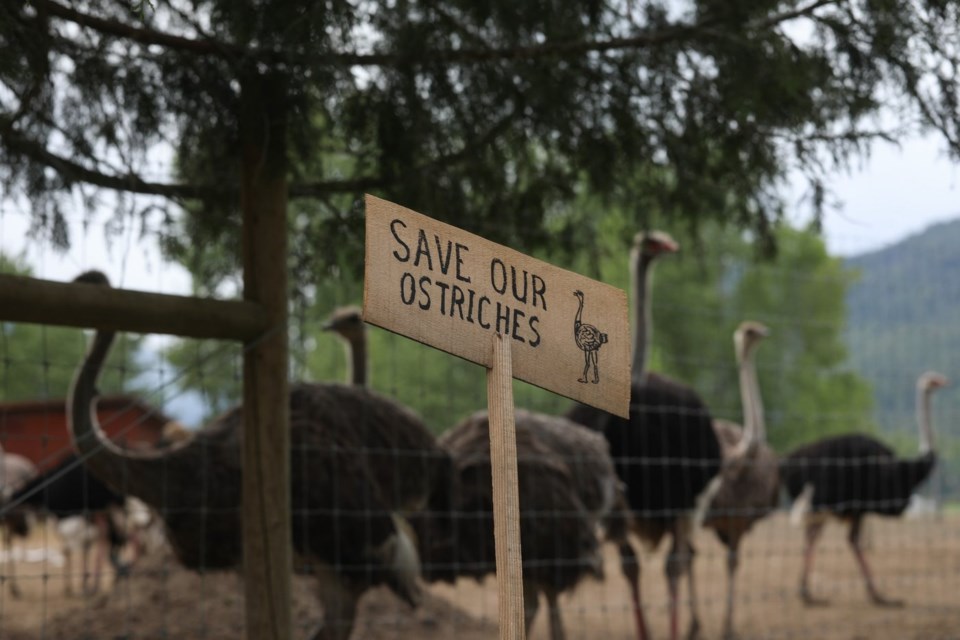OTTAWA — The Federal Court of Appeal reserved its decision in a case involving two B.C. farmers who are fighting an order from the Canadian Food Inspection Agency to destroy around 400 ostriches after an outbreak of avian flu.
After hearing arguments on Tuesday in Ottawa, Justice Mary Gleason told the court that the panel of three judges will try to make a decision quickly, noting that the case dates back to December.
The CFIA ordered Universal Ostrich Farms to cull about 400 birds after 69 ostriches died in December and January.
The agency tested two of the dead birds in January and found a "novel reassortment" of the highly contagious avian flu virus, which had not been seen anywhere else in Canada.
It also fined the farm's owners, Karen Espersen and Dave Bilinski, for failing to report the outbreak and for failing to adhere to quarantine measures.
The Federal Court denied the farm's application for a judicial review of the CFIA's order, ruling that the agency's decision was reasonable and procedurally fair, and that it is not up to the courts to resolve scientific disputes.
The courts granted a stay of the CFIA's order to destroy the herd while the case was appealed.
The farm's lawyer, Umar Sheikh, told the Federal Court of Appeal on Tuesday that the agency ordered all the ostriches to be culled just 41 minutes after receiving the positive test results.
Sheikh said in his arguments that there is evidence ostriches fare better than other birds in the case of an outbreak, with a lower mortality rate than chickens, for example.
At issue in the appeal is the CFIA's application of the "stamping out" policy, which is defined by the World Organization of Animal Health.
The policy states that if highly pathogenic avian flu is discovered, steps must be taken to destroy any animals or things on the property that were infected or exposed, and the environment must be decontaminated.
Sheikh said the CFIA is applying the policy in a one-size-fits-all manner and argued that is not appropriate, pointing out that no ostriches have died on the farm since January and the farmers believe all the birds have recovered.
The court heard Tuesday that the virus can live in water and soil for months at a time, and that even seemingly healthy ostriches may spread the virus to other animals, including mammals.
Universal Ostrich Farms has said the loss of the herd would put their three-decade operation out of business.
The CFIA says the stamping out policy is a critical part of maintaining not only animal and human health, but also Canada's status as a reliable international trading partner.
Lawyers from the federal government argued Tuesday that the agency made the decision to adopt the stamping out policy in 2004 in an effort to try to control the virus. Several other countries, including key trading partners like the U.S., apply the same policy.
Because of that, the lawyers argued, the inspector who received a positive test at Universal Ostrich Farms didn't have discretion about whether to order the animals to be destroyed.
The current outbreak of avian flu has been ongoing in Canada since 2021, lawyer Aileen Jones noted.
The Federal Court of Appeal heard that this case was believed to be the first time the stamping out policy was applied in Canada to ostriches, but the CFIA said ostriches were considered in the decision to adopt the policy.
Jones said the CFIA considered an alternative approach that would involve testing individual animals and destroying only those that were infected, but it determined that the risk of spread could not be mitigated.
Sheikh argued that the Appeal Court should consider the full context of this case, and said it would be an injustice to allow a decision that was made in December to result in the deaths of hundreds of animals with no further testing more than six months later.
Universal Ostrich Farms wants the agency to return to test the ostriches on the farm, and applied to the Federal Court of Appeal for permission to do its own independent testing. That application was denied.
The farm had also applied for an exemption to the cull order for animals with rare genetics because they are involved in research with Japanese and American researchers who are examining ostriches' immune systems. The CFIA denied that application on Jan. 10.
The agency said it was not provided with documentation, including active research trial logs or detailed research protocols, and said the farm is not suitable for controlled trials or research.
The ostriches live outside and it's believed they were exposed to the virus when a flock of hundreds of wild ducks visited a pond on the property in the fall.
The case has garnered international attention, including from U.S. Health Secretary Robert F. Kennedy Jr. and TV personality Dr. Mehmet Oz, who have supported the farmers. Oz even offered to relocate the ostriches to his Florida property.
The farm also has a vocal group of supporters, including some who camped out on the rural property near Edgewood, B.C., earlier in the spring in an effort to save the birds from destruction. The farm hosted a live music event at the farm dubbed "Farm Aid Canada" last weekend to fundraise for the cost of travel to court and legal fees.
Espersen and her daughter, Katie Pasitney, who has been acting as the farm's spokesperson, were in court on Tuesday.
A handful of supporters joined them, in some cases carrying signs saying "save the ostriches" and wearing T-shirts with ostriches on them. Several shook their heads as the government's lawyers notified the court they will be seeking $7,000 in costs should the court rule in their favour.
This report by The Canadian Press was first published July 15, 2025.
Sarah Ritchie, The Canadian Press



